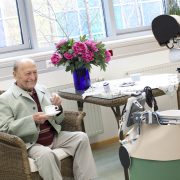STRANDS – Spatio-Temporal Representations and Activities For Cognitive Control in Long-Term Scenarios
The aim was to ensure that the robot can find its way in a dynamic, busy environment over long periods of time, i.e. without direct technical support. STRANDS was one of the first projects in which a robot was used outside of scientific laboratories or apartments adapted for scientific test purposes over a longer period of time – so the project was pioneering.
In addition to the necessary technical developments, the acceptance of robots should also be researched at the social science level. With a combination of qualitative and quantitative data (mixed method designs) we evaluated individual tasks of the robot as well as attitudes and impressions towards robots.
Project partners: ACIN Technical University of Vienna, Reihnland University of Applied Sciences Aachen, University of Birmingham, University of Leeds, University of Lincoln, Technical University of Stockholm, G4S Technology & Transport Systems Catapult.
Duration: April 2013 – March 2017
Funds: EU Seventh Framework Program
Project homepage: http://strands.acin.tuwien.ac.at/




